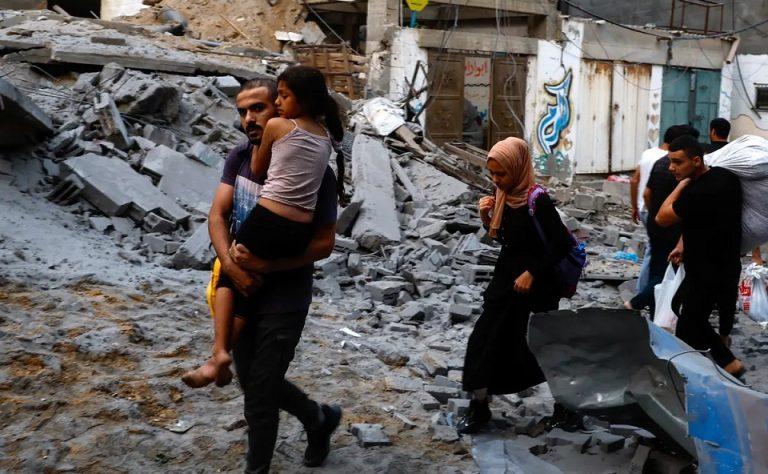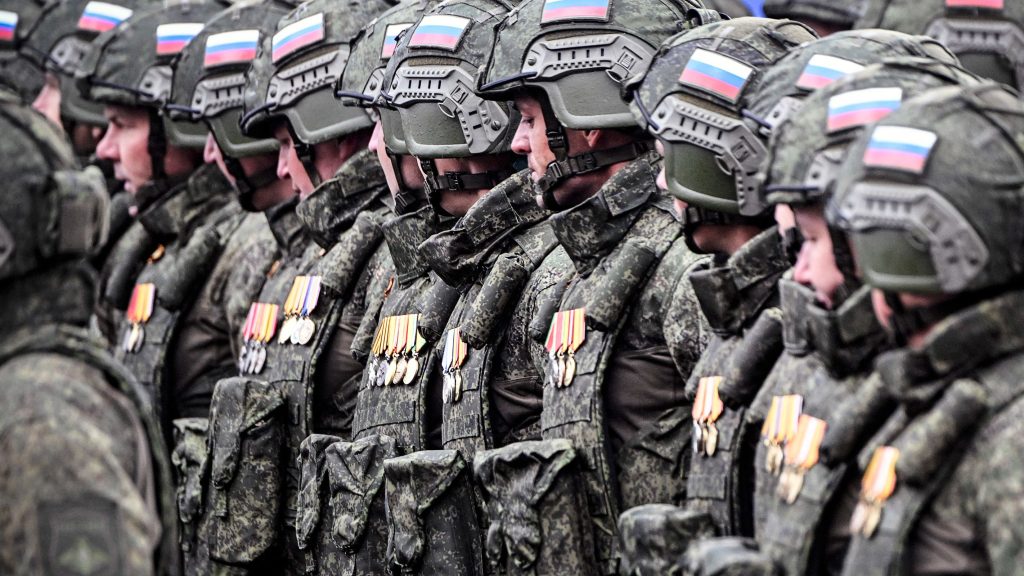Headline
Gaza War Rages On Christmas Eve As Biden Urges Caution

Israel pushed on Sunday with its military campaign to destroy Hamas over the October 7 attacks, as the focus of the deadly combat shifted to southern Gaza where most displaced Palestinians are trapped.
US President Joe Biden stressed the “critical need” to protect civilians, in a call with Prime Minister Benjamin Netanyahu, who vowed Israel would “continue the war until all of its goals have been achieved”, officials said.
As heavy fighting raged on, the Israeli army said it had struck another 200 targets in the past 24 hours in the besieged Palestinian territory where it is seeking to defeat Hamas and free remaining hostages.
The army said 153 troops had died in Gaza since it launched its ground invasion on October 27. Ten soldiers were lost in battles on Saturday, one of the deadliest days for the Israeli side.
“This is a difficult morning, after a very difficult day of fighting in Gaza,” said Netanyahu. “The war is exacting a very heavy price… but we have no choice but to keep fighting.”
READ ALSO: Rockets Fired At US Embassy In Baghdad Amid Gaza War
The army said soldiers had raided a northern Gaza compound near schools, a mosque and a clinic and found “explosive belts adapted for children, dozens of mortar shells, hundreds of grenades and intelligence documents”.
Hamas rejected those claims as lies meant “to justify their massacring of innocent civilians and their destructive aggression that has affected the entire infrastructure… in the already blockaded Gaza Strip”.
The bloodiest ever Gaza war broke out when Hamas attacked southern Israel on October 7 and its Islamist militants killed about 1,140 people, mostly civilians, according to an AFP tally based on Israeli figures.
The gunmen also seized around 250 hostages, 129 of whom are believed to remain in Gaza following the exchange of captives for Palestinians prisoners during a week-long truce late last month.
Israel’s withering military campaign, including massive aerial bombardment, has killed 20,424 people, mostly women and children, according to the Hamas-run territory’s health ministry.
READ ALSO: Israel Sends Dozens Of Tanks Into Southern Gaza
Vast areas of Gaza lie in ruins and its 2.4 million people have endured dire shortages of water, food, fuel and medicine due to an Israeli siege, alleviated only by the limited arrival of aid trucks.
Eighty percent of Gazans have been displaced, according to the UN, many now shielding against the winter cold in makeshift tents and forced into the south of Gaza even as ground fighting comes closer.
Near the far southern Gaza city of Rafah, Umm Amir Abu al-Awf, 27, suffered wounds to her hand and legs in a strike on her house early Sunday.
“Who won?” she said. “Nothing has been achieved except killing civilians… They keep saying Rafah is safe. It is not safe. Nowhere is safe. Every house has a martyr and injured.”
‘More hatred, less peace’
Israeli military spokesman Jonathan Conricus indicated that forces were close to gaining operational control in northern Gaza and that now “we focus our efforts against Hamas in southern Gaza”.
READ ALSO: Five Countries Seek ICC Investigation Into Gaza War
Fighting has raged in the main southern city of Khan Yunis, the birthplace of Yahya Sinwar, Hamas’ leader in Gaza and the man Israel holds most responsible for the October 7 attack.
Elsewhere, Palestinian rescuers scrambled again to pull survivors and bodies from the rubble of a destroyed residential building, after a strike hit in the central city of Deir al-Balah.
“I was praying when a huge explosion occurred,” said Yazan Moqbel, a wounded man whose sister was still under the broken concrete. “Rubble fell on us. I didn’t know what happened.”
The head of the UN refugee agency, Filippo Grandi, urged an end to the suffering in the third month of the war.
“For aid to reach people in need, hostages to be released, more displacement to be avoided and above all stop the appalling loss of lives, a humanitarian ceasefire in Gaza is the only way forward,” he wrote on X, formerly Twitter.
“War defies logic and humanity, and prepares a future of more hatred and less peace.”
READ ALSO: Israel-Hamas War Taking Away Focus From Ukraine, Zelensky Laments
On Friday, the United States allowed the passage of a UN Security Council resolution that effectively called on Israel to allow “immediate, safe and unhindered” deliveries of life-saving aid to Gaza “at scale”.
World powers had wrangled for days over the wording and, at Washington’s insistence, toned down some provisions — including removing a call for a ceasefire.
One displaced Gazan, Ahmad al-Burawi, now living in Rafah in southern Gaza, said: “We just want to return to our lands, that’s all. We want a solution… People are dying.”
Silent Christmas
As the war rages on, Christians around the world celebrate Christmas Eve, and festivities are usually held in the occupied West Bank city of Bethlehem where they believe Jesus was born.
But this year the city is almost deserted, with few worshippers around and no Christmas tree erected, after church leaders decided to forego “any unnecessarily festive” celebrations, in solidarity with Gazans.
Palestinian president Mahmud Abbas voiced hope Christmas would mark “a cessation of the Israeli war against the Palestinian people in Gaza, as well as across the occupied Palestinian territories”.
READ ALSO: Iran Executes Man Convicted Of Spying For Israel
The Gaza war has heightened tensions across the Middle East, where Israel faces a range of enemies — Iran-backed armed groups in Lebanon, Syria, Iraq and Yemen that have voiced strong support for Hamas.
Cross-border fire has erupted almost daily between Israel and Lebanon’s powerful Hezbollah movement.
And Yemen’s Huthi rebels have fired at cargo vessels in the Red Sea, leading the United States to build a naval taskforce to deter the missile and drone strikes.
The US military said four drones had targeted the USS Laboon, but had been shot down, and that an Indian-flagged tanker was hit and sent out a distress call.
Iran’s deputy foreign minister, Ali Bagheri, denied the Islamic republic was orchestrating the campaign, saying the Huthis act on their “own decisions and capabilities”.
British Foreign Secretary David Cameron, in an interview published Sunday, branded Iran “a thoroughly malign influence in the region and in the world”.
AFP
Headline
Insecurity: US Congressman Riley Moore Reveals Trump’s Mission In Nigeria

US Congressman Riley Moore has dismissed insinuations that President Donald Trump is attempting to bring war to Nigeria.
Moore made the remark in a post on his verified X handle on Monday.
His comments followed a US military airstrike on a terrorist enclave in north-west Nigeria on Christmas Day, reportedly carried out on the directive of President Trump.
“President Trump is not trying to bring war to Nigeria, he’s bringing peace and security to Nigeria and to the thousands of Christians who face horrific violence and death.
READ ALSO:Russia Calls up 135,000 Military Personnel
“The strikes against ISIS on Christmas, in coordination with the Nigerian government, have given hope to the Christians in Nigeria,” he said.
Recall that the lawmaker had previously stated that President Trump is focused on ending the killing of Christians in Nigeria.
It will be recalled that Moore led a US delegation on a fact-finding mission into alleged Christian genocide in Nigeria some weeks ago.
During his brief stay in the country, Moore travelled to Benue State, where he interfaced with religious and traditional leaders, as well as internally displaced persons.
Headline
Russia Calls up 135,000 Military Personnel

Russia has enlisted 135,000 conscripts for military service in 2026, following the conclusion of the autumn army draft by the Defense Ministry.
A statement on Monday said most personnel have been assigned to training units and military formations where they will “get a military specialty and learn to operate modern military hardware.”
The conscripts can choose to serve in any of the various military branches and armed services after an assessment of their health condition and the results of psychological examinations.
READ ALSO:Russian Strike On Odesa Region Kills Eight, Injures 27
The ministry disclosed that 680 recruits have joined scientific and research-production units, while 240 from the country’s national teams in Olympic disciplines joined sports companies.
However, military personnel who have served the established term of military service have been discharged and sent to their places of residence.
The latest enlistment confirms Russia is shoring up its troops deployed to the ongoing special military operation in Ukraine ahead of the new year.
READ ALSO:Putin Says Russia Ready For War, Blames Europe For Sabotaging Peace
A fortnight ago, European leaders reaffirmed their pledge to form a multinational force–under the aegis of the Coalition of the Willing–to assist Ukraine in securing land, skies, and seas.
The pledge is one of the six commitments the EU and heads of state developed for Ukraine’s security and economic recovery support measures.
In an interview with TASS on Sunday, Russian Foreign Minister Sergey Lavrov condemned Europe’s insistence on sending military forces to Ukraine.
“We have said many times that our Armed Forces would view them as a legitimate target,” he said, warning that anyone who attacks Russia would face “a devastating blow.”
Headline
How Our Airstrikes Stopped Christmas Attacks In Nigeria — US Lawmaker

Riley Moore, a member of the United States House of Representatives from West Virginia’s 2nd District, has linked the absence of Christmas attacks in Nigeria this year to US military airstrikes carried out against Islamist militants on Christmas Day.
In a post on his official X account on Saturday, Moore contrasted the situation with the past two Christmas seasons, during which he claimed Christians were killed in attacks across parts of Nigeria.
The lawmaker noted that this year’s response targeted extremist groups instead of marking another period of violence.
READ ALSO:Rep Moore Confirms 12 Tomahawk Missiles Launched In Sokoto
He added that US forces acted decisively against militants in coordination with the Nigerian government.
“For the past two Christmases, Christians have been murdered in Nigeria. This year, thanks to @POTUS, Radical Islamic Terrorists were on the receiving end of 12 Tomahawk missiles as a present.
“The successful strikes on ISIS, in coordination with the Nigerian government, are just the first step to secure the country and end the slaughter of our brothers and sisters in Christ,” Moore wrote.
US President Donald Trump said on Thursday that American forces had conducted deadly strikes against Islamic State terrorists in north-western Nigeria.
Trump, who spoke via his Truth Social platform, warned that more attacks would follow if the militants continued killing Christians, adding that the Department of War executed numerous “perfect strikes.”

 Headline4 days ago
Headline4 days agoJUST IN: US Forces Bomb Terrorists Camps In Nigeria

 News5 days ago
News5 days agoOkpebholo Slams ₦25bn Libel Suit On Edo PDP Chairman

 Headline4 days ago
Headline4 days agoUS Dept Of War Shares Video Of Air Strikes In Nigeria

 News4 days ago
News4 days agoPHOTOS: SGF George Akume Weds Ooni’s Ex-Queen

 News1 day ago
News1 day agoBREAKING: Anthony Joshua Involved In Road Accident

 News4 days ago
News4 days agoTrump’s Airstrikes: Halt Military Cooperation With US Immediately – Sheikh Gumi Tells Tinubu Govt

 News4 days ago
News4 days agoShehu Sani Reacts To Trump’s Military Strikes In Nigeria

 Headline4 days ago
Headline4 days agoU.S. Lawmaker Reacts To Nigeria, U.S. Airstrikes

 News2 days ago
News2 days agoEx-Edo Gov Obaseki Reacts As His Cousin Is Beaten, Stripped

 News5 days ago
News5 days agoYULETIDE: UBTH CMD Charges Nigerians To Be Hopeful In Coming Year




























